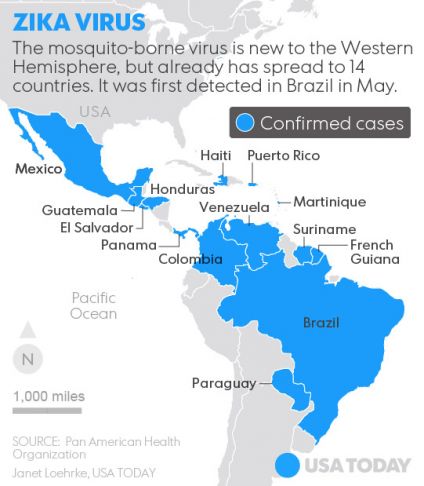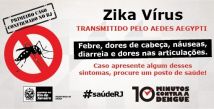UPDATED (1/20) | Zika, a debilitating illness spread by mosquitoes and potentially through sex, was confirmed in three Florida patients Tuesday and is producing an extraordinary threat in the Americas, health officials say. “We didn’t feel we could wait,” a scientist for the Centers for Disease Control and Prevention said last week.
Florida health officials acknowledged that two cases of Zika were diagnosed recently in Miami-Dade County and one in Hillsborough. The cases involved people who traveled to Colombia and Venezuela in December. Travel-related Zika cases were also confirmed in Texas, Illinois, and Hawaii, according to reports.
 » CDC journal: "Our findings support the hypothesis that ZIKV can be
» CDC journal: "Our findings support the hypothesis that ZIKV can be
transmitted by sexual intercourse."
“We believe this is a fairly serious problem. This virus is spreading throughout the Americas,” said Dr. Lyle Petersen of the CDC.
But unlike other mosquito-borne illnesses such as chikungunya, another relative newcomer to Florida, and dengue, Zika can spread, in rare cases, through sexual intercourse or infected blood, health officials warn.
In 2009 a Colorado researcher who was studying mosquitoes in Senegal was diagnosed with Zika. After returning to the U.S. his wife became ill. The U.S. National Institutes of Health said the couple were the first confirmed case of an insect-borne disease transmitted through sex.
On Friday the CDC advised pregnant women to avoid travel to 14 countries in Central and South America and the Caribbean. In Brazil Zika is being linked to brain damage in infants, the CDC said. There is no vaccine or antiviral protection.
The same species of mosquito (Aedes aegypti) that also hosts dengue and chikungunya also carries Zika and is common in Florida. Dengue sickened dozens in Florida in 2014. At the time, state health officials said the illnesses probably resulted from travel to high-risk countries.
“Sooner or later, our mosquitoes will pick it up,” said Dr. Walter Tabachnick of the Florida Medical Entomological Laboratory in Vero Beach. “The threat is greater than I’ve seen in my lifetime.”
Zika is an epidemic in Brazil, where authorities estimate between 500,000 and 1.5 million cases, according to reports. The virus is suspected of causing microcephaly in thousands of newborns. The condition can result in undersized brains and skulls.
Birth defects were not linked with Zika until last May, when the virus was first identified in Brazil. The CDC has confirmed at least 22 U.S. cases of Zika in travelers since 2007. Brazil will host the Summer Olympics Aug. 5-21.
Zika was identified in 1947 in a rhesus monkey in the Zika Forest in Uganda. The first cases in humans were in 1952 in Uganda and Tanzania.
Commercial kits to diagnose Zika do not exist, according to the World Health Organization. Special blood tests are required to set Zika apart from dengue or chikungunya.
Chikungunya spread locally in Florida for the first time in 2014. It was also the first case in the United States outside of Puerto Rico and the U.S. Virgin Islands.
 » Related: Zika: Hurts like dengue, can spread through sex (June 2015)
» Related: Zika: Hurts like dengue, can spread through sex (June 2015)
Outside
Bitcoin mining emissions in China will hit 130 million tonnes by 2024 https://t.co/w6He7so8N2 pic.twitter.com/qYUDtBdeRK
— New Scientist (@newscientist) April 9, 2021
The Gunk Report
For the Blue-Green Algal Bloom Weekly Update from the Florida Department of Environmental Protection, tap here. For DEP's Algal Bloom Sampling Map, tap here.
What, me worry?
» "PLAYING WITH SHARKS," which recently premiered at the Sundance Film Festival, documents diving legend Valerie Taylor.